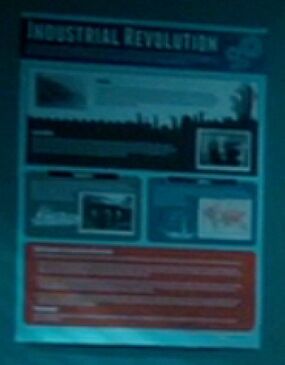Industrial Revolution: Difference between revisions
66 Seconds (talk | contribs) No edit summary |
NateBumber (talk | contribs) m (speedy rename prep) Tag: 2017 source edit |
||
| Line 3: | Line 3: | ||
The '''Industrial Revolution''' began in the late [[18th century]] and saw a move from small-scale manufacturing often done in people's homes to large-scale factories, complete with specially built machinery that enabled mass production. ([[PROSE]]: ''[[A History of Humankind (novel)|A History of Humankind]]'') | The '''Industrial Revolution''' began in the late [[18th century]] and saw a move from small-scale manufacturing often done in people's homes to large-scale factories, complete with specially built machinery that enabled mass production. ([[PROSE]]: ''[[A History of Humankind (novel)|A History of Humankind]]'') | ||
The invention of [[steam]]-powered machinery also led to the development of the [[railway]]s. [[George Stephenson]], "the father of the railway", notably built his first locomotive in [[1814]]. | The invention of [[steam]]-powered machinery also led to the development of the [[railway]]s. [[George Stephenson]], "the father of the railway", notably built his first locomotive in [[1814]]. His son [[Robert Stephenson|Robert]] was also heavily involved in the development of the railways. ([[PROSE]]: ''[[A History of Humankind (novel)|A History of Humankind]]'') | ||
One of the times during which {{O'Mara}} was conducting her [[sleep]] chemical experiments was the Industrial Revolution. ([[TV]]: ''[[The Mark of the Rani (TV story)|The Mark of the Rani]]'') | One of the times during which {{O'Mara}} was conducting her [[sleep]] chemical experiments was the Industrial Revolution. ([[TV]]: ''[[The Mark of the Rani (TV story)|The Mark of the Rani]]'') | ||
| Line 14: | Line 14: | ||
A [[Third Industrial Revolution]] was on its way by the time [[human]]s arrived on [[Planet (Smile)|a colony planet]]. There, the [[Vardy|Vardies]] were the worker bees, according to the [[Twelfth Doctor]]. ([[TV]]: ''[[Smile (TV story)|Smile]]'') | A [[Third Industrial Revolution]] was on its way by the time [[human]]s arrived on [[Planet (Smile)|a colony planet]]. There, the [[Vardy|Vardies]] were the worker bees, according to the [[Twelfth Doctor]]. ([[TV]]: ''[[Smile (TV story)|Smile]]'') | ||
{{TitleSort}} | {{TitleSort}} | ||
[[Category:18th century Earth history]] | [[Category:18th century Earth history]] | ||
[[Category:19th century Earth history]] | [[Category:19th century Earth history]] | ||
Latest revision as of 19:42, 4 May 2021
The Industrial Revolution began in the late 18th century and saw a move from small-scale manufacturing often done in people's homes to large-scale factories, complete with specially built machinery that enabled mass production. (PROSE: A History of Humankind)
The invention of steam-powered machinery also led to the development of the railways. George Stephenson, "the father of the railway", notably built his first locomotive in 1814. His son Robert was also heavily involved in the development of the railways. (PROSE: A History of Humankind)
One of the times during which the First Rani was conducting her sleep chemical experiments was the Industrial Revolution. (TV: The Mark of the Rani)
The Tenth Doctor took Mai Kondo to 1814 to see the beginnings of the Industrial Revolution. (PROSE: The Frozen) According to the Third Doctor, the Dæmons had inspired the Industrial Revolution. (TV: The Dæmons)
In 1852, some saw the Industrial Revolution as having been an unfortunate development in the wrong direction. (AUDIO: The Enchantress of Numbers)
Miss Shah's Coal Hill history classroom bore a poster on the Industrial Revolution. (TV: The Coach with the Dragon Tattoo, Co-Owner of a Lonely Heart)
A Third Industrial Revolution was on its way by the time humans arrived on a colony planet. There, the Vardies were the worker bees, according to the Twelfth Doctor. (TV: Smile)

